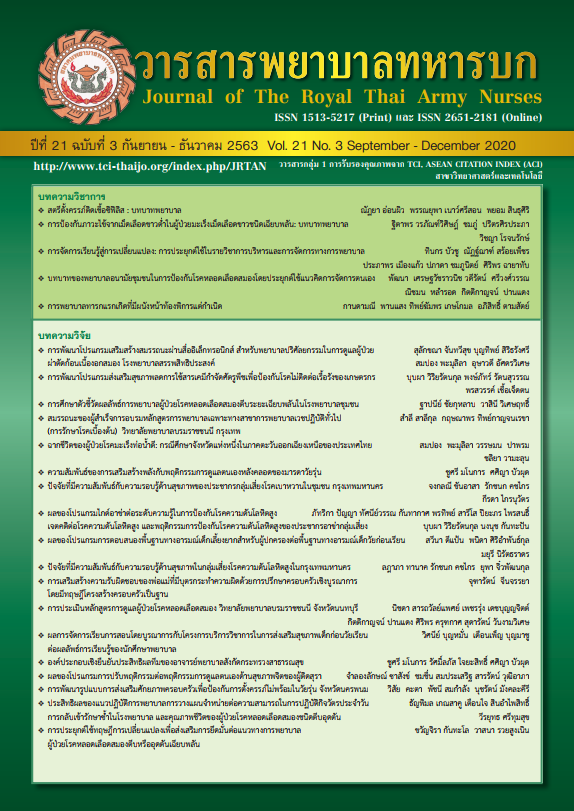ประสบการณ์การดูแลตนเองของผู้สูงอายุติดเตียง
คำสำคัญ:
ผู้สูงอายุติดเตียง, การดูแลตนเองบทคัดย่อ
การวิจัยเชิงคุณภาพมีวัตถุประสงค์เพื่อศึกษา ประสบการณ์การดูแล การริเริ่ม พัฒนา และรับผิดชอบการพัฒนา ความสามารถในการดูแลเพื่อตอบสนองความต้องการของตนเอง กลุ่มตัวอย่าง เลือกแบบเจาะจง เป็นผู้สูงอายุติดเตียงที่สามารถ สื่อสารภาษาไทยได้เข้าใจ และเป็นผู้สูงอายุติดเตียง 1 ปีขึ้นไป จำนวน 8 คน เครื่องมือวิจัย คือ แบบสัมภาษณ์เจาะลึกกึ่งโครงสร้าง ซึ่งคณะผู้วิจัยสร้างขึ้นตามแนวคิดทฤษฎีการดูแลตนเองของโอเร็ม รวบรวบข้อมูลโดยการสัมภาษณ์เชิงลึก เป็นรายบุคคล วิเคราะห์ ข้อมูลเชิงเนื้อหาตามแบบของจีออจี ผลการวิจัยพบว่า 1) การดูแลตนเองของผู้สูงอายุติดเตียง หมายถึง การปฏิบัติกิจกรรมเพื่อ ให้ตนเองมีความคงสภาพความสามารถร่างกาย ให้คงอยู่ ไม่เกิดปัญหาทางสุขภาพเพิ่มมากขึ้น รวมถึงการหาองค์ความรู้เพื่อนำมา ส่งเสริม พัฒนาการปฏิบัติ ที่ทำให้ตนเองสามารถปฏิบัติกิจวัตรประจำวันได้อย่างมีคุณภาพ หรือ/และได้เพิ่มขึ้น และเป็นการกระทำ ที่เป็นภาระกับผู้ดูแล ญาติน้อยที่สุด 2) การดูแลตนเอง ประกอบด้วย การดูแลให้ตนเองได้รับอาหาร น้ำ อากาศ อย่างเพียงพอ และเป็นไปตามความสะดวกของผู้ดูแล ได้มีการขับถ่ายเป็นไปตามปกติ มีร่างกายและสิ่งแวดล้อมที่สะอาด ได้เคลื่อนไหว พักผ่อน ตามเหมาะสม ยอมรับการเปลี่ยนแปลงตามวัยที่เกิดขึ้น และหากมีภาวการณ์เบี่ยงเบนทางสุขภาพ ได้หาความรู้ ขอความช่วยเหลือ จากผู้อื่น ปฏิบัติตามแผนการรักษา และปรับตัวให้อยู่กับสภาพที่เป็นอยู่
Downloads
เอกสารอ้างอิง
Nikolich-Žugich J, Goldman DP, Cohen PR, Cortese D, Fontana L, et, al. Preparing for an Aging World: Engaging Biogerontologists, Geriatricians, and the Society, The Journals of Gerontology: Series A. 2016; 71(4): 435–444.
Miljkovic N, Lim JY, Miljkovic I & Frontera WR. Aging of skeletal muscle fibers. Annals of rehabilitation medicine. 2015; 39(2): 155–162.
Suwannarat P, Thaweewannakij T, Kaewsanmung S, Srisim K, Phonthee S, Mato L, et, al. Walking Device Used in Community-Dwelling Elderly, Journal of Nursing and Health Care. 2014; 32(3): 86-92.
Department of Older Persons, Ministry of social Development and Human security (Revised version). Measures to Implement National Agenda on Aged Society. Bangkok: Amarin Printing & Publishing Public Co., Ltd. 2562. (in Thai)
McLeod SA. Maslow’s hierarchy of needs. Simply Psychology. 2018.
Orem DE. A concept of self-care for the rehabilitation client. Rehabilitation Nursing Journal. 1985; 10(3): 33-36.
Matsee C, Waratwichit C. Promotion of Health Literacy: From Concept to Practice. Boromarajonani College of Nursing, Uttaradit Journal; 2017; 9(2).
Plodpluang U. Data Analysis in Phenomenology Studies. Nursing Journal of the Ministry of Public Health. 2013; 23(2): 1-10.
Orem DE. Nursing Concepts of Practice. 5thed. Boston: Mosby; 1995.
Chatthong A. Knowledge about mental health: Aging…not worthless. Bangkok: Department of mental Health; 2016.
Peate I, Nair M. Anatomy and physiology for nurses at a glance Pondicherry: John Wiley & Sons; 2015.
Selanders L, Lake K, Crane P. The voice of Florence Nightingale on advocacy. Journal of Issues in Nursing; 2012. 17(1).
Caspi A, Houts RM, Belsky DW, Goldman-Mellor SJ, Harrington HL, Israel S, et al. The p factor: One general psychopathology factor in the structure of psychiatric disorders? Clinical Psychological Science; 2014: 2.
Watcharaporn P, Siriporn B. Quality of life of air force retirees and families with chronic illness received palliative care. Journal of Royal Thai Army Nurses; 2017; 18(3):244-250.(in Thai)
Jintana A, Ruchanee P. The trend of elderly care in 21st century: Challenging in nursing care. Journal of Royal Thai Army Nurses; 2018; 19(1):39-46.(in Thai)
ดาวน์โหลด
เผยแพร่แล้ว
รูปแบบการอ้างอิง
ฉบับ
ประเภทบทความ
สัญญาอนุญาต
บทความหรือข้อคิดเห็นใดใดที่ปรากฏในวารสารพยาบาลทหารบกเป็นวรรณกรรมของผู้เขียน ซึ่งบรรณาธิการหรือสมาคมพยาบาลทหารบก ไม่จำเป็นต้องเห็นด้วย
บทความที่ได้รับการตีพิมพ์เป็นลิขสิทธิ์ของวารสารพยาบาลทหารบก
The ideas and opinions expressed in the Journal of The Royal Thai Army Nurses are those of the authors and not necessarily those
of the editor or Royal Thai Army Nurses Association.







